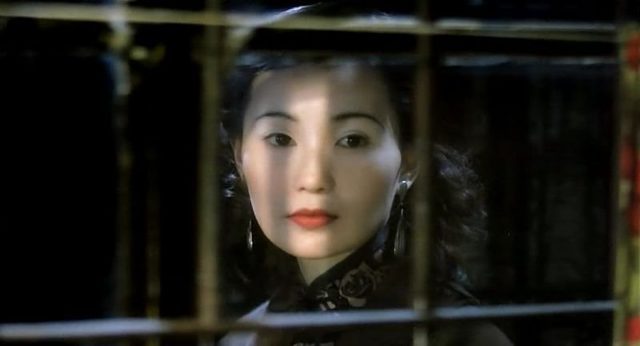
The magnificent Maggie Cheung takes center stage in retrospective at Metrograph
Center Stage (Stanley Kwan, 1991)
Metrograph
7 Ludlow St. between Canal & Hester Sts.
Thursday, December 8, 1:30, 4:15, 7:00
Tuesday, December 20, 7:00
Series runs December 8-31
212-660-0312
metrograph.com
“Isn’t she a replica of myself?” Maggie Cheung says of Chinese actress Ruan Ling-yu in 1991’s Center Stage, in which Cheung plays Ruan as well as herself. “Maggie, may I ask if you wish to be remembered half a century later?” a man asks, to which Cheung responds, “That’s not so important to me. If future people do remember me, it won’t be the same as Ruan Ling-yu, as she halted her career at the age of twenty-five, when she was at her most glorious. Now she is a legend.” The Hong Kong–born Cheung is now a legend herself, having made more than ninety films since her career began in 1984, when she was nineteen; current and future people are sure to remember the glamorous superstar who continues to help spread Chinese cinema around the world. Cheung, a former model and beauty queen, is being celebrated in the Metrograph series “Maggie Cheung: Center Stage,” running December 8 to 31 and consisting of twenty of her best films, all shown in 35mm, made with such directors as Wong Kar-wai, Olivier Assayas, Jackie Chan, Johnnie To, Tsui Hark, and Stanley Tong. In Center Stage, which kicks off the series, Cheung is radiant as both herself and Ruan as director Stanley Kwan goes back and forth between the present, as Cheung is making the film, and the past, as she portrays Ruan rising from an extra to a star in the late 1920s and early 1930s, at the same time Japan is mounting attacks against China. Cheung, who was named Best Actress at prestigious film festivals in Berlin, Chicago, Taiwan, and Hong Kong for the role, is joined by a stellar cast, including Chen Yen-yen, Lily Li, Tony Leung Ka-fai, Carina Lau, and Chin Han; the real Ruan is seen in archival footage. Made twenty-five years ago, Center Stage, also known simply as Actress, is an excellent start to this wide-ranging series, which features — in addition to the below works — such other films as the Police Story trilogy, The Iceman Cometh, Paper Marriage with Sammo Hung, and In the Mood for Love, one of the most lush and gorgeous romances ever made.
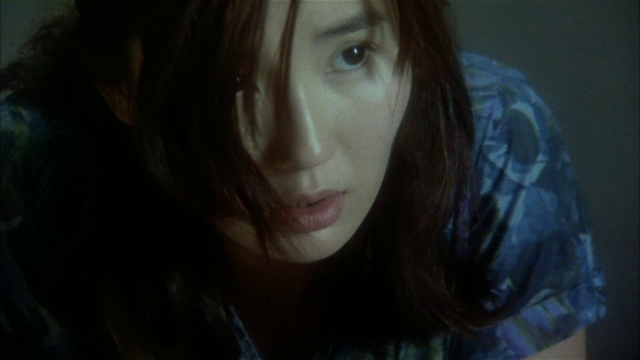
Wong Kar-wai favors close-ups of Maggie Cheung in DAYS OF BEING WILD
DAYS OF BEING WILD (A FEI JING JUEN) (Wong Kar-wai, 1990)
Saturday, December 10, 7:45, 10:00
metrograph.com
 Wong Kar-wai’s second film, Days of Being Wild — following the surprising success of his debut feature, As Tears Go By — was a popular failure, as Hong Kong audiences were not yet ready for his introspective, character-driven, nonlinear style. (However, it did win five Hong Kong Film Awards, including Best Picture and Best Actor.) Days is Wong’s first film with master cinematographer Christopher Doyle, who shot all of Wong’s work through 2004, including Chungking Express, Fallen Angels, Happy Together, and In the Mood for Love. The late Leslie Cheung, who jumped out a hotel window in 2003, stars as Yuddy, a disaffected, beautiful youth who lures in women and then, after they fall in love with him, verbally mistreats them and cheats on them. Among his conquests are the gorgeous Su-Lizhen (Maggie Cheung), often shot in magnificent close-up, and the trampy Mimi (Carina Lau), who is jealous of Su, who takes comfort in telling her tale of woe to local police officer Tide (Andy Lau). Meanwhile, Yuddy, who was raised by a former prostitute, is obsessed with finding his birth mother. Set in 1960, the film’s leitmotif involves time and memory, with clocks ticking loudly and lots of long, lingering looks. The story goes a bit haywire in the latter sections, although the ending is a gem. (Look for Tony Leung there.)
Wong Kar-wai’s second film, Days of Being Wild — following the surprising success of his debut feature, As Tears Go By — was a popular failure, as Hong Kong audiences were not yet ready for his introspective, character-driven, nonlinear style. (However, it did win five Hong Kong Film Awards, including Best Picture and Best Actor.) Days is Wong’s first film with master cinematographer Christopher Doyle, who shot all of Wong’s work through 2004, including Chungking Express, Fallen Angels, Happy Together, and In the Mood for Love. The late Leslie Cheung, who jumped out a hotel window in 2003, stars as Yuddy, a disaffected, beautiful youth who lures in women and then, after they fall in love with him, verbally mistreats them and cheats on them. Among his conquests are the gorgeous Su-Lizhen (Maggie Cheung), often shot in magnificent close-up, and the trampy Mimi (Carina Lau), who is jealous of Su, who takes comfort in telling her tale of woe to local police officer Tide (Andy Lau). Meanwhile, Yuddy, who was raised by a former prostitute, is obsessed with finding his birth mother. Set in 1960, the film’s leitmotif involves time and memory, with clocks ticking loudly and lots of long, lingering looks. The story goes a bit haywire in the latter sections, although the ending is a gem. (Look for Tony Leung there.)
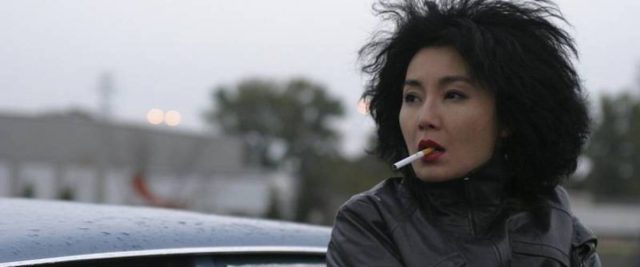
Maggie Cheung is electrifying in ex-hubby Olivier Assayas’s CLEAN
CLEAN (Olivier Assayas, 2004)
Friday, December 16, 4:30, 9:30
metrograph.com
 With their divorce pending, writer-director Olivier Assayas and Hong Kong superstar Maggie Cheung wish each other a fond farewell in the moving drama Clean. Named Best Actress at the 2004 Cannes Film Festival for her extraordinary performance, Cheung stars as Emily Wang, a junkie trying to resuscitate the fading music career of her heroin-addicted lover, Lee (British musician James Johnston). Their life together is so screwed up that they rarely see their son, Jay (James Dennis), who lives in Vancouver with Lee’s parents (Nick Nolte and Martha Henry). On the road, Emily scores some drugs, fights with Lee, goes out for a ride, then returns to find him dead from an overdose and the cops waiting to arrest her. After six months in prison, she gets out to find that her life has changed more than she could ever have imagined. Cheung is effervescent every step of the way, lighting up the screen despite playing a very hard-to-like character; her tender scenes with the soft-spoken, grizzled Nolte are particularly gentle and touching. Unfortunately the subplot set in the music world is clichéd, annoying, and mostly unnecessary, everything that the rest of the film is not. The stunt casting is particularly irritating: Tricky, the band Metric, and Mazzy Star’s David Roback all play themselves. The otherwise fine cast also includes Béatrice Dalle, Jeanne Balibar, Don McKellar, and Laetitia Spigarelli, with a soundtrack dominated by ethereal songs by Brian Eno.
With their divorce pending, writer-director Olivier Assayas and Hong Kong superstar Maggie Cheung wish each other a fond farewell in the moving drama Clean. Named Best Actress at the 2004 Cannes Film Festival for her extraordinary performance, Cheung stars as Emily Wang, a junkie trying to resuscitate the fading music career of her heroin-addicted lover, Lee (British musician James Johnston). Their life together is so screwed up that they rarely see their son, Jay (James Dennis), who lives in Vancouver with Lee’s parents (Nick Nolte and Martha Henry). On the road, Emily scores some drugs, fights with Lee, goes out for a ride, then returns to find him dead from an overdose and the cops waiting to arrest her. After six months in prison, she gets out to find that her life has changed more than she could ever have imagined. Cheung is effervescent every step of the way, lighting up the screen despite playing a very hard-to-like character; her tender scenes with the soft-spoken, grizzled Nolte are particularly gentle and touching. Unfortunately the subplot set in the music world is clichéd, annoying, and mostly unnecessary, everything that the rest of the film is not. The stunt casting is particularly irritating: Tricky, the band Metric, and Mazzy Star’s David Roback all play themselves. The otherwise fine cast also includes Béatrice Dalle, Jeanne Balibar, Don McKellar, and Laetitia Spigarelli, with a soundtrack dominated by ethereal songs by Brian Eno.
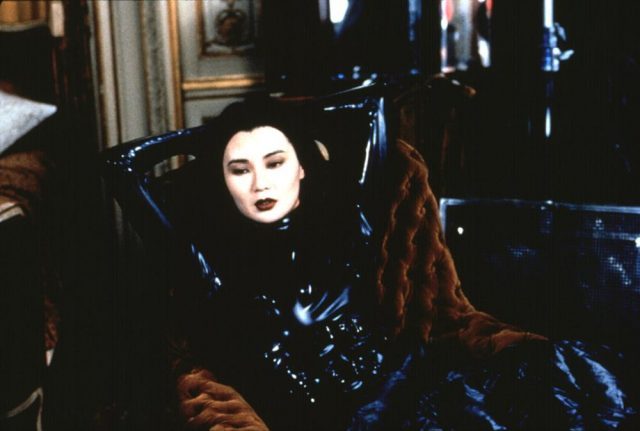
Maggie Cheung is wasted in Olivier Assayas’s Truffaut tribute, IRMA VEP
IRMA VEP (Olivier Assayas, 1996)
Friday, December 16, 2:15, 7:00
metrograph.com
 Olivier Assayas pays homage to François Truffaut’s Day for Night in this piece of pseudoartistic fluff about a film crew’s attempts at remaking Louis Feuillade’s 1915 classic Les Vampires. The great Maggie Cheung, who later married and divorced Assayas, is wasted as the star of the remake, and Truffaut regular Jean-Pierre Léaud, playing the director, is frustratingly unintelligible when he speaks in English, which unfortunately is a lot in this high-falutin’ mess.
Olivier Assayas pays homage to François Truffaut’s Day for Night in this piece of pseudoartistic fluff about a film crew’s attempts at remaking Louis Feuillade’s 1915 classic Les Vampires. The great Maggie Cheung, who later married and divorced Assayas, is wasted as the star of the remake, and Truffaut regular Jean-Pierre Léaud, playing the director, is frustratingly unintelligible when he speaks in English, which unfortunately is a lot in this high-falutin’ mess.
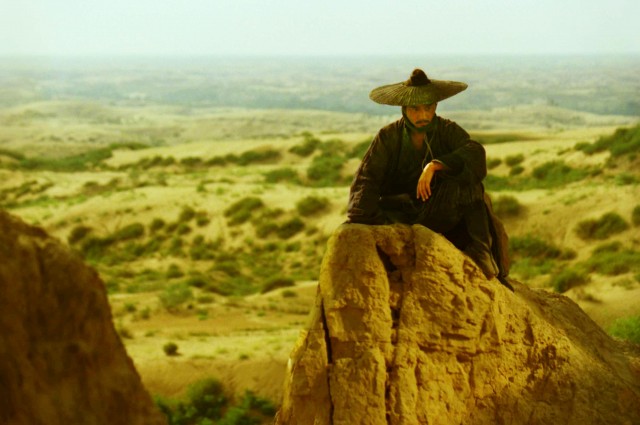
ASHES OF TIME REDUX is another strikingly beautiful work from director Wong Kar-wai, cinematographer Christopher Doyle, and actress Maggie Cheung
ASHES OF TIME REDUX (Wong Kar-wai, 2008)
Saturday, December 17, 7:00
Monday, December 19, 5:00, 9:15
metrograph.com
 Back in 1993, writer-director Wong Kar-wai’s Ashes of Time was released, a thinking man’s martial arts epic inspired by Jin Yong’s The Eagle-Shooting Heroes novels. With numerous versions in circulation and the original negatives in disrepair, Wong (Chungking Express, In the Mood for Love) decided to painstakingly reedit and restore the film fifteen years later, renaming it Ashes of Time Redux. The plot – which is still as confusing as ever — revolves around Ouyang Feng (Leslie Cheung), a loner who lives in the desert, where people come to him when they need someone taken care of. Every year he is visited by Huang Yaoshi (Tony Leung Ka-fai), who keeps him informed of the world outside jianghu — especially about his lost love (Maggie Cheung). Meanwhile, Murong Yang (Brigitte Lin) has demanded that Ouyang kill Huang for having jilted his sister, Murong Yin (also played by Lin), who in turn hires Ouyang to kill Yang. There’s also a blind swordsman (Tony Leung Chiu Wai), a peasant girl with a basket of eggs (Charlie Young), a poor, rogue swordsman (Jacky Cheung), and a bottle of magic wine that can erase memories. Or something like that. But what’s most impressive about Ashes of Time Redux is Christopher Doyle’s thrilling, swirling cinematography, which sweeps the audience into the film, and Wu Tong’s rearranged score, based on the original music by Frankie Chan and Roel A. Garcia and featuring soaring cello solos by Yo-Yo Ma.
Back in 1993, writer-director Wong Kar-wai’s Ashes of Time was released, a thinking man’s martial arts epic inspired by Jin Yong’s The Eagle-Shooting Heroes novels. With numerous versions in circulation and the original negatives in disrepair, Wong (Chungking Express, In the Mood for Love) decided to painstakingly reedit and restore the film fifteen years later, renaming it Ashes of Time Redux. The plot – which is still as confusing as ever — revolves around Ouyang Feng (Leslie Cheung), a loner who lives in the desert, where people come to him when they need someone taken care of. Every year he is visited by Huang Yaoshi (Tony Leung Ka-fai), who keeps him informed of the world outside jianghu — especially about his lost love (Maggie Cheung). Meanwhile, Murong Yang (Brigitte Lin) has demanded that Ouyang kill Huang for having jilted his sister, Murong Yin (also played by Lin), who in turn hires Ouyang to kill Yang. There’s also a blind swordsman (Tony Leung Chiu Wai), a peasant girl with a basket of eggs (Charlie Young), a poor, rogue swordsman (Jacky Cheung), and a bottle of magic wine that can erase memories. Or something like that. But what’s most impressive about Ashes of Time Redux is Christopher Doyle’s thrilling, swirling cinematography, which sweeps the audience into the film, and Wu Tong’s rearranged score, based on the original music by Frankie Chan and Roel A. Garcia and featuring soaring cello solos by Yo-Yo Ma.